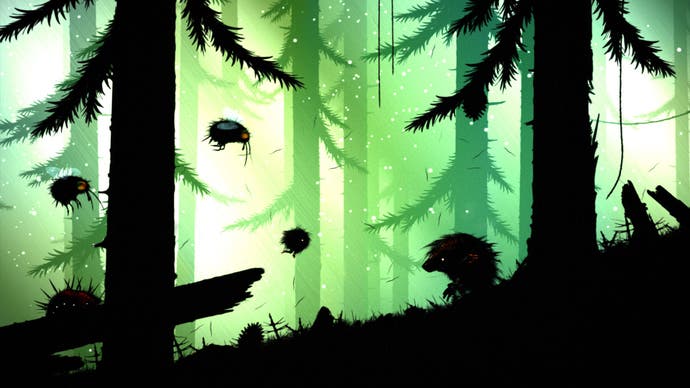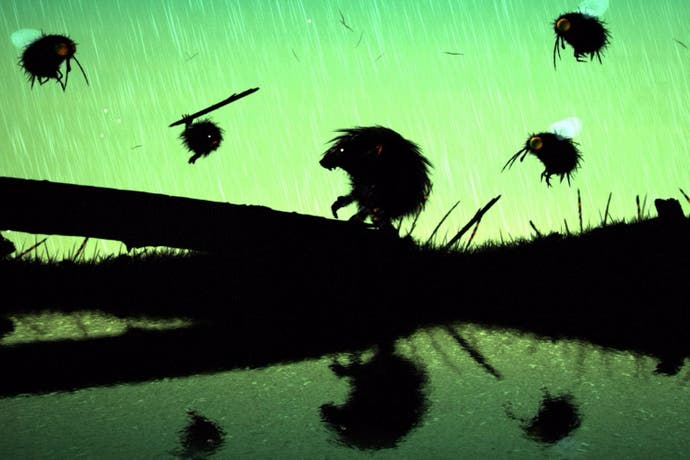Feist review
Where the wild things are.
Has any film opening topped the excitement of Raiders of the Lost Ark? The initial approach of our fedora-sporting hero plunging through jungle ruins (braving copious quantities of tarantulas in the process) is ominous, but nothing our hero can't handle. A runaway boulder presents a greater challenge, but even this is all in a days work for Dr. Jones. Then a tribe starts spitting venomous darts at Indy and by this point all bets are off. Start the damn plane!
For adventurers, the worse things get, the better. As a result, these sequences of derring-do are riveting in film, but don't always translate so well to video games. Make the escape too easy and we feel pandered to. Ramp it up too much and failure leads to frustration as each retry becomes increasingly methodical and wearisome. Swiss developers Adrian Stutz and Florian Faller at Bits & Beasts cunningly navigate this tightrope in their debut title Feist by doing away with scripted sequences and giving players just enough leeway to bounce back from a near fatal error. When things go pear-shaped, they only get more exciting.
Feist begins with your character, a wooly fluffball, freeing themselves from a beast's trap. From there the concept is simple: go right. It's an uncomplicated set-up, cut from the cloth of Mario and Sonic, but an effective one all the same. In many ways, Feist is as remarkable for what it doesn't include as much as for what it does. There's no plot, dialogue or collectables to hamper the pacing. Feist isn't a game about collecting knick-knacks or spinning a yarn; it's about just one thing: fleeing.
Yet Feist isn't an auto-runner (though it is published under the umbrella of Canabalt creator Adam Saltzman's company Finji). You'll frequently hit dead ends where you'll have to quickly think on your feet as a pack of spiders, bees and trolls are nipping at your heels. Often the solution involves arranging objects in the environment to give you a boost. Assembling an escape plan while being hunted is never less than exhilarating.
This is due to unpredictable enemy AI and a strong emphasis on physics. Rocks roll, traps are set off by ragdolling foes, and items tumble out of your hands every time you get hit. One moment you're holding onto a fly-like creature using its needle-spitting ability as a makeshift gun, the next your former weapon is free and has become a killing machine. It's always a mad scramble to construct a ramp, defeat a boss or simply sprint through the forest with so many moving pieces in play.
Special mention should be made for the way Feist handles player health - or, more accurately, doesn't. From what I could gather, there's no way to determine how close to death you are. Collecting flies heals you, but how much they heal you is a mystery. As such, you never get the all-too-familiar feeling of "ah snap, I messed up. I should reset." As long as you're moving, you've still got a chance!
Feist's minimalist design is refreshingly breezy. It's compact and enthralling enough that its brisk running time of two hours feels just about right. However, there are ways in which Feist is a little too bare bones for its own good.

The forest setting is an appealing one with enchanting backdrops, moody weather effects and a haunting score by Tomek Kolczynski. These evoke a sense of progression, but there's not enough narrative momentum in this two-toned environment to fulfill a compelling arch. When the final (disappointingly cliched) cutscene kicked off, I had no idea I was even nearing the end. Perhaps I should have known, as I was struggling with what was easily Feist's most frustrating encounter.
On that note, there are a few moments when Feist loses sight of what makes it so special and relies on more conservative material. A couple of chase sequences feel overly scripted and the handful of boss encounters do little to distinguish themselves from one another.
Feist isn't the first 2D platformer to handle unscripted physics-focused skirmishes well, but there's a purity of vision in its savage scenarios. Like the similarly brief Hotline Miami, Feist is one of those delectable morsels of a game that remains just as entertaining to revisit as it is the first time around. It may be a fraction too unambitious in the long run to really withstand the test of time - especially as it shares a genre with the likes of Spelunky, Rayman and Mario - but it's still a promising debut for Stutz and Faller. More than that, it's a rousing romp on its own terms.











